実施日 : 2017年01月20日(金)
Notice: Yokohama: Wakabadai Apartment Complex Press Tour
投稿日 : 2017年01月04日
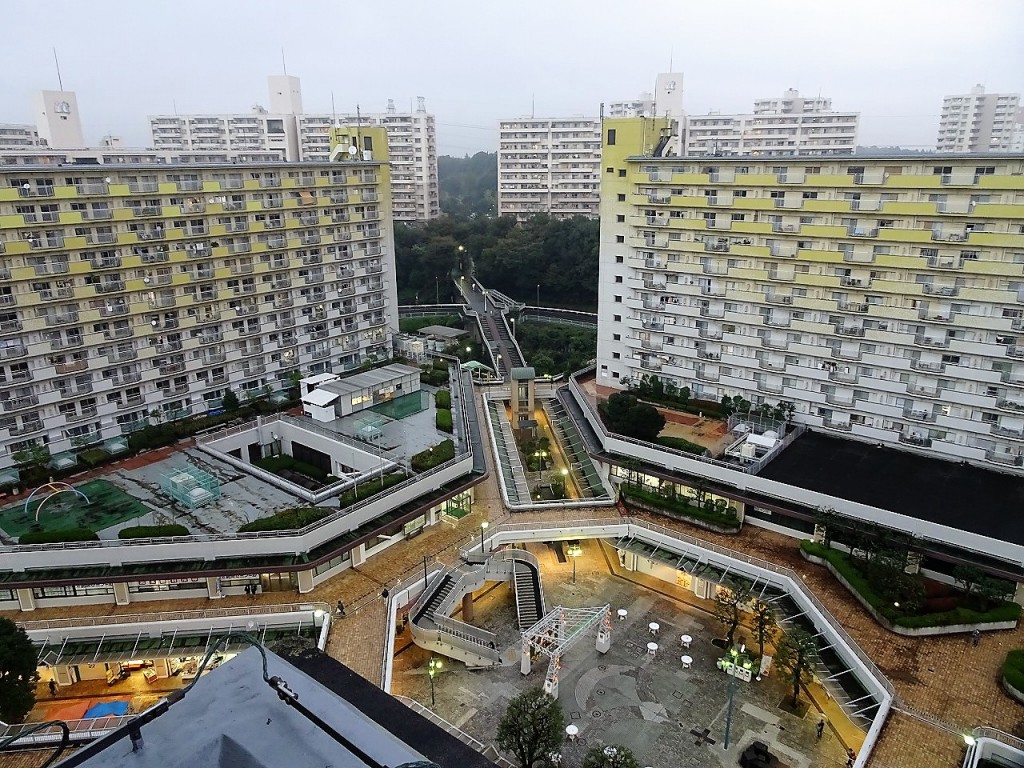
-Pioneering examples of Integrated Community Care System at a large-scale apartment complex
dealing with population decline and super-aging-
Located on a hill in Asahi ward in the northwest of Yokohama, Wakabadai Danchi [apartment complex] covers 900,000 square meters, making it one of the largest danchi in Yokohama. The danchi will be 39 years old this year, and although it is over three kilometers from the nearest train station, frequent buses provide it with good access to the city center. The danchi has a hospital, post office, and educational facilities such as an elementary school and junior high school on its grounds. There is also a shopping arcade with a large supermarket, beauty salon, clothing store, and fast food restaurant, as well as tennis courts and other places to exercise, and multiple parks. Almost everything necessary to live a normal life is located in the danchi.
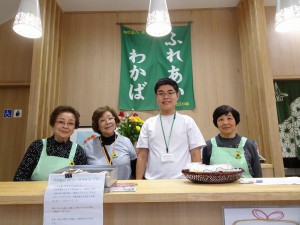
At its peak in 1992, Wakabadai Danchi had more than 20,000 residents, but that number has now fallen to less than 15,000, with the population continuing to decline. Although the ratio of seniors (people 65 years old or older) in Yokohama and Asahi ward are 22.9% and 27.8%, respectively, the ratio of seniors in Wakabadai Danchi is extremely high, at 43.7%. Estimated to reach 54% in 10 years, the danchi can be looked at as a microcosm of the near future of Japan, with its declining population and super-aging society.
In less than 10 years, the approximately 6.5 million members of the dankai generation born during the first baby boom (1947-1949) will all be 75 years old or older, and Japan will become a super-aged society the likes of which no other country has ever experienced. As a result, a shortage of medical and nursing care services is expected, especially in metropolitan areas, which is referred to as the 2025 Problem.
Considering the tendency for people to prefer living in the same place the older they are, Wakabadai Danchi is hurriedly working to prepare for an even greater number of senior residents. Residents are cooperating with the management company and local government on initiatives such as keeping an eye on senior residents to help prevent kodokushi (people dying alone without being noticed) and to delay the need for nursing care, as well as providing lifestyle support and home nursing care services. Efforts are also being made to improve service to support raising children, to create an environment to attract younger residents and help revitalize the danchi.
This press tour will visit Wakabadai Danchi, where residents, NPOS, the management company, and local government are all working together to deal with the issues of a super-aging society and on initiatives to make the danchi appealing to young residents.
*This press tour is sponsored by Yokohama City, with planning cooperation by the FPCJ.
*This press tour will require participants to bear part of the cost, but is not a profit-making venture.
1. Tour Details
(1) History of Wakabadai Danchi and Wakabadai Residents’ Association Alliance
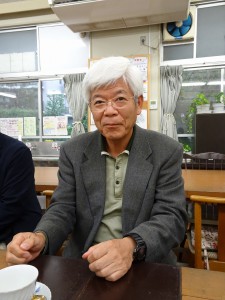 Developed by the Kanagawa Prefectural Housing Supply Corporation (KJK), Wakabadai Danchi began accepting residents in 1978. With 792 rental units in 7 buildings and 5,186 units for sale in 66 buildings, there are a total of 6,304 residential units in the danchi, among the most of any danchi in Yokohama, and as of August 2016 there were 14,658 residents. Since it was built after clearing the trees and fields on a hill with no personal residences, the original residents all moved there from other areas. The 10 community associations in the danchi worked to bring together these strangers, coordinated by the Wakabadai Residents’ Association Alliance. The Alliance worked actively to solve issues facing the danchi, planning events such as a summer festival to encourage interaction between residents and in order to “make the danchi feel like home to the children,” and working together with KJK and the local government on initiatives to support seniors and young families.
Developed by the Kanagawa Prefectural Housing Supply Corporation (KJK), Wakabadai Danchi began accepting residents in 1978. With 792 rental units in 7 buildings and 5,186 units for sale in 66 buildings, there are a total of 6,304 residential units in the danchi, among the most of any danchi in Yokohama, and as of August 2016 there were 14,658 residents. Since it was built after clearing the trees and fields on a hill with no personal residences, the original residents all moved there from other areas. The 10 community associations in the danchi worked to bring together these strangers, coordinated by the Wakabadai Residents’ Association Alliance. The Alliance worked actively to solve issues facing the danchi, planning events such as a summer festival to encourage interaction between residents and in order to “make the danchi feel like home to the children,” and working together with KJK and the local government on initiatives to support seniors and young families.
After hearing the history of Wakabadai Danchi from Mr. Hiroki Yamagishi, chairman of the Wakabadai Residents’ Association Alliance, representatives of the Yokohama City Housing & Architecture Bureau and KJK will speak about the size of the danchi, population trends, and rate of aging. An Asahi Ward official will discuss initiatives to support seniors and families raising children, using Wakabadai Danchi as an example. There will also be an opportunity to film and photograph the danchi from near the top of a building.
(2) Initiatives to Attract Young Residents to the Danchi and Encourage Intergenerational Exchange
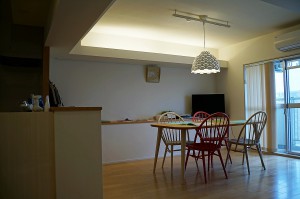 Trial Apartment
Trial Apartment
In 2015, KJK started a system allowing prospective tenants the opportunity to try staying in the danchi for a trial period. By letting them experience living in the danchi, the goal is to have prospective tenants see how livable it is, with its ample greenery and amenities. So far, the trial apartment has been used by 30 groups, and five of them decided to move to the danchi.
The tour will visit the trial apartment and be able to film and photograph it.
Wakaba Family Plaza Soramame
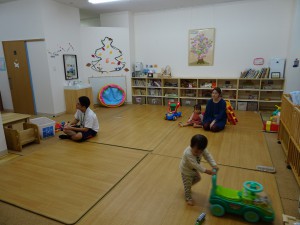
Wakaba Family Plaza Soramame was opened in 2014 in an empty storefront in the shopping arcade to create a location for parents with children up to three years old to gather. Soramame receives subsidies from Yokohama City’s Family Meeting Plaza Project, the goal of which is to provide places for parents to exchange information and more opportunities to consult with the parenting advisers. It is hoped this will help support parents raising children in the community and decrease the burden on parents. Danchi residents with childcare worker or other qualifications work as staff at Soramame. For an annual membership fee of 500 yen and 100 yen a day, residents can use the space to let their children play and eat lunch. Some days, up to seven families will visit. Although there is a daycare in the danchi, there was no place for parents with children to casually meet. Some users commented, “It would have been nice to have this place sooner.”
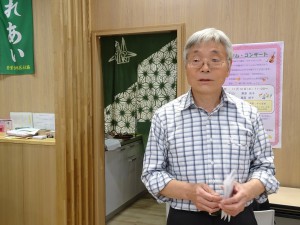 Soramame is run by Wakabadai NPO. Originally the local social welfare council, which argued for support for local seniors, parents, and people with disabilities, it became an NPO in 2009. The NPO runs a number of projects, including a cafeteria run mainly by people with disabilities and using empty storefronts to create community spaces.
Soramame is run by Wakabadai NPO. Originally the local social welfare council, which argued for support for local seniors, parents, and people with disabilities, it became an NPO in 2009. The NPO runs a number of projects, including a cafeteria run mainly by people with disabilities and using empty storefronts to create community spaces.
After Director Masaaki Shiraiwa (71) explains the activities of Wakabadai NPO, Facility Director Etsuko Haruguchi will introduce Soramame, and there will be an opportunity to interview users and film/photograph the facility.
Community Office & Dining Haru
Community Office & Dining Haru was also opened in a vacant storefront along the shopping arcade, in 2015. Staffed mainly by women living in the danchi, they provide home-style meals. There is also office space alongside the restaurant, which is mainly used by mothers with young children for events and releasing information in order to encourage young families to move to the danchi. There are hopes that in the future it will also act as a space for retired danchi residents to provide assistance to young entrepreneurs.
The tour will eat lunch at Dining Haru, and interview female danchi residents working in the kitchen.
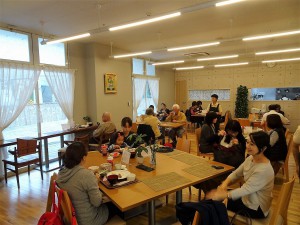
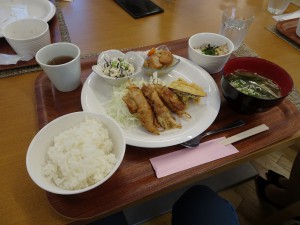
(3) Continuing to Live in a Familiar Environment: Responding to Seniors Medical and Nursing Care Needs, and Delaying the Need for Nursing
Wakabadai Community Salon Himawari/Home-visit Nursing Station and Support Office Asagao
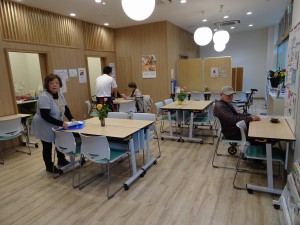 Wakabadai Community Salon Himawari was opened by Wakabadai NPO in a vacant storefront along the shopping arcade in March 2016. This community space is unique for including the functions of a lifestyle support center for seniors. In the tea room, users can talk with staff who have received training in listening carefully. For a monthly membership fee of 500 yen, residents can receive periodic phone calls and home visits to make sure they are alright, or have a spare key kept at Himawari. For 500 yen per 30 minutes, Himawari staff will also perform chores such as shopping or cleaning to help out with daily life. Currently, over 30 seniors are using these services.
Wakabadai Community Salon Himawari was opened by Wakabadai NPO in a vacant storefront along the shopping arcade in March 2016. This community space is unique for including the functions of a lifestyle support center for seniors. In the tea room, users can talk with staff who have received training in listening carefully. For a monthly membership fee of 500 yen, residents can receive periodic phone calls and home visits to make sure they are alright, or have a spare key kept at Himawari. For 500 yen per 30 minutes, Himawari staff will also perform chores such as shopping or cleaning to help out with daily life. Currently, over 30 seniors are using these services.
Home-visit Nursing Station and Home Care Support Office Asagao, located together with Himawari, is operated by Akaeda Hospital, the local danchi hospital. Staffed in rotation by four nurses and two care managers from the hospital, Asagao provides residents with 24-hour medical and nursing care services at home. Residents can also request that a care manager act as their proxy for applying for certification as requiring nursing care, the first step to receiving services under long-term care insurance. The reason it was established was due to a lack of medical and nursing care services to provide certification as requiring nursing care, or support after having been hospitalized. According to Director Shiraiwa of Wakabadai NPO, “Considering the rate the population is aging, it is important to have nursing care facilities in the danchi.” Although only a few residents are using Asagao so far, it has been receiving attention as a project preparing for the future.
The tour will visit Himawari and Asagao, and hear about lifestyle support services and home medical and nursing care services in the danchi.
Wakabadai Community Care Plaza
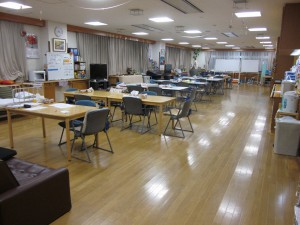 Wakabadai Community Care Plaza is a facility that provides consultations about parenting and nursing care, and day care for seniors. It is one of 133 community care plazas in the city. They are centers for welfare and health services unique to Yokohama City, and once a week instruct seniors in exercises to help delay the need for nursing care. According to Facility Director Chieko Ikeda, over 90% of day care users are residents of Wakabadai Danchi. Only 12% of residents are certified as requiring nursing care, the lowest of the 12 care plazas in Asahi ward, and also significantly lower than the 17.5% for Yokohama as a whole. One reason for there being so many healthy seniors is their active participation in the various activities of the danchi, which is encouraged by welfare commissioners. Welfare commissioners are commissioned by the Minister of Health, Labour, and Welfare to provide consultations to local residents. There are 230,000 welfare commissioners registered throughout Japan. The welfare commissioner at the danchi is closely involved with the community, visiting homes and holding events periodically. When they notice something wrong with a senior, they inform the care plaza, allowing the community as a whole to take action quickly.
Wakabadai Community Care Plaza is a facility that provides consultations about parenting and nursing care, and day care for seniors. It is one of 133 community care plazas in the city. They are centers for welfare and health services unique to Yokohama City, and once a week instruct seniors in exercises to help delay the need for nursing care. According to Facility Director Chieko Ikeda, over 90% of day care users are residents of Wakabadai Danchi. Only 12% of residents are certified as requiring nursing care, the lowest of the 12 care plazas in Asahi ward, and also significantly lower than the 17.5% for Yokohama as a whole. One reason for there being so many healthy seniors is their active participation in the various activities of the danchi, which is encouraged by welfare commissioners. Welfare commissioners are commissioned by the Minister of Health, Labour, and Welfare to provide consultations to local residents. There are 230,000 welfare commissioners registered throughout Japan. The welfare commissioner at the danchi is closely involved with the community, visiting homes and holding events periodically. When they notice something wrong with a senior, they inform the care plaza, allowing the community as a whole to take action quickly.
The tour will hear about the role Wakabadai Community Care Plaza plays in the danchi, and how it collaborates with Himawari and Asagao. There will be a chance to film and photograph the seniors’ day care and exercises to delay the need for nursing care.
Wakabadai Sports & Culture Club NPO
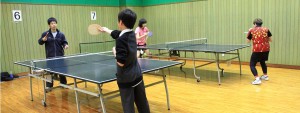 Wakabadai Sports & Culture Club NPO coordinates activities at various facilities in the danchi such as tennis courts, the baseball field, school grounds and gymnasiums to ensure various organizations can use them without issue. It is also involved in creating opportunities for residents to interact, such as a sports festival, a culture festival, and competitions for sports such as ground golf (developed in Japan), are held 17 times a year. Member registration is required to use facilities operated by the NPO, but around 1,700 people are members, with approximately 60% of them 60 years old or older (as of 2015). Over the course of a year, a total of 85,000 people use these facilities, demonstrating how seniors are also actively enjoying sports. It is hoped that encouraging seniors to be active and go outside will help delay the need for nursing care.
Wakabadai Sports & Culture Club NPO coordinates activities at various facilities in the danchi such as tennis courts, the baseball field, school grounds and gymnasiums to ensure various organizations can use them without issue. It is also involved in creating opportunities for residents to interact, such as a sports festival, a culture festival, and competitions for sports such as ground golf (developed in Japan), are held 17 times a year. Member registration is required to use facilities operated by the NPO, but around 1,700 people are members, with approximately 60% of them 60 years old or older (as of 2015). Over the course of a year, a total of 85,000 people use these facilities, demonstrating how seniors are also actively enjoying sports. It is hoped that encouraging seniors to be active and go outside will help delay the need for nursing care.
The tour will visit the Wakabadai Community Center Gymnasium, and be able to film and photograph club activities (ping pong).
2. Itinerary:
Friday, January 20, 2017
|
8:15-8:55 |
Yokohama City Hall→Wakabadai Danchi (chartered bus) |
|
9:00-10:00 |
Briefing by Yokohama City, Asahi Ward, Wakabadai Residents’ Association Alliance and KJK |
|
10:10-10:20 |
Film and photograph the danchi from near the top of a building |
|
10:30-11:35 |
Trial apartment |
|
11:45-12:20 |
Wakaba Family Plaza Soramame |
|
12:25-13:45 |
Community Office & Dining Haru |
|
13:50-14:25 |
Wakabadai Community Salon Himawari/Home-visit Nursing Station and Support Office Asagao |
|
13:35-15:45 |
Wakabadai Community Care Plaza |
|
15:55-16:15 |
Wakabadai Community Center Gymnasium |
|
16:25-17:00 |
Q&A |
|
17:15-17:55 |
Wakabadai Danchi→Yokohama City Hall (chartered bus) |
*The above itinerary is subject to change.
3. Qualification: Bearer of Gaimusho Press Registration Card
4. Cost: 1,500 yen per person including lunch
(FPCJ will later inform the participants of methods for payment, cancellation fee, etc.)
5. Participants: Limited to 10 applicants
(Only one reporter and one photographer from each company, but two participants from each TV team will be acceptable.)*If the number of applicants exceeds 10, an upper limit may be set on the number of participants from each country/region.
6. FPCJ Contact: Ms. Yokota (TEL: 03-3501-3405)
7. Remarks:
(1) There may be some restrictions on photographing and filming at the tour sites. Please follow the instructions of the officials on duty.
(2) Yokohama City and FPCJ will not be liable for any inconvenience, trouble or accidents that might occur during the tour.


